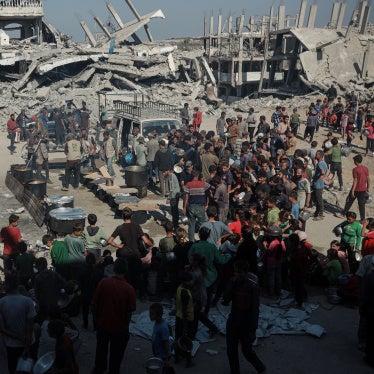On a Saturday night in late October, the Indonesian Embassy in Washington hosted a special screening of the movie "Eat Pray Love," in which Julia Roberts's character spends time in Bali coping with heartache. This light-hearted diplomatic foray will no doubt be used to draw attention to the more attractive realities of contemporary Indonesia--its landscape, its food, its cultural richness.
Over the previous week, however, a rather different movie about Indonesia has garnered some attention in Washington. The grainy, jerky 10-minute video, taken on a mobile phone, shows two men from Indonesia's easternmost province of Papua being horribly tortured by members of the Indonesian military. The elder of the two men screams in pain as the soldiers repeatedly burn his genitals with a smoldering piece of wood; the younger man bears a look of abject terror as a large knife is shifted from his throat to his face. No attractive realities of contemporary Indonesia are on display here, and Indonesian authorities have admitted the video is not a work of fiction.
As President Barack Obama embarks on his much-awaited visit to Jakarta, it's the 10-minute grainy video, not the Hollywood blockbuster, that merits his attention.
The administration's public rhetoric to date has borne a closer resemblance to the "Eat Pray Love" version of Indonesia. The Pentagon, after resuming assistance to the notoriously abusive Indonesian special forces, announced before the Papua torture video came to light that not only has the Indonesian military "undertaken several critical institutional reforms," it has also "made great strides in institutionalizing human rights training." Secretary of State Hillary Clinton and the National Security Council have in recent months publicly extolled Indonesia's democratic virtues, but had precious little to say about Indonesia's ugly side.
To be sure, the Indonesia of today would have been all but unthinkable two decades ago. Since emerging from dictatorship in 1998, Indonesia has had peaceful transfers of power through democratic elections. It has multiple political parties, and dozens of press outlets and non-governmental organizations.
But push through some of the rhetoric, and some significant problems persist. Gains in freedom of expression have been compromised by a spate of criminal defamation cases, some of which entail officials suing citizens who have done nothing more than criticize them. Indonesia's enhanced regional standing has yet to translate into vigorous diplomacy that challenges ASEAN's safety blanket of "non-interference." And, in a country known for its pluralism and tolerance, religious intolerance appears to be on the rise, with a spate of attacks on Christian churches, threats by a government minister to ban the Ahmadi religious community, and Koran burnings.
Impunity for members of the security forces may be the most significant failure of Indonesia's transition to date. No justice has been done for widespread atrocities committed in plain sight of the United Nations--and the world-- during the UN-brokered referendum in East Timor in 1999. Families of student leaders "disappeared" in the late 1990s have yet to see anyone held criminally responsible in a civilian court. Few even contemplate looking further back to the countless abuses that accompanied Suharto's more than three decades of authoritarian rule.
In the past two weeks, the Indonesian government has pledged a military investigation into the Papua video. But it is precisely such investigations of the military by the military-- lacking independence, impartiality, and transparency--that have contributed to impunity. It is this reality that gives soldiers the sense they can commit gross abuses, film it, and get away with it. Moreover, after admitting that the perpetrators in the video were indeed soldiers, and pledging to swiftly investigate and prosecute, it became clear last week that no such steps had in fact been taken. Those who tortured continue to serve with impunity.
Worst of all, while I was debating whether to attend the Embassy's screening, an email--with yet another video that appears to show soldiers mistreating captives--made the decision for me.
The Obama administration is right to praise the steps Indonesia has taken, but it does no one any good to pursue a public line about Indonesia that sounds like the stuff of Hollywood. When the administration has acknowledged some of these problems, it has done so reluctantly, and rarely in public. Helping Indonesia truly become what the administration describes--entrenching a judicial system that holds all wrongdoers to account, holding the military genuinely accountable to civilian authorities, and vigorously defending the rights of its most vulnerable citizens--requires that those problems continue to share top billing.
Sophie Richardson is Asia advocacy director at Human Rights Watch.






